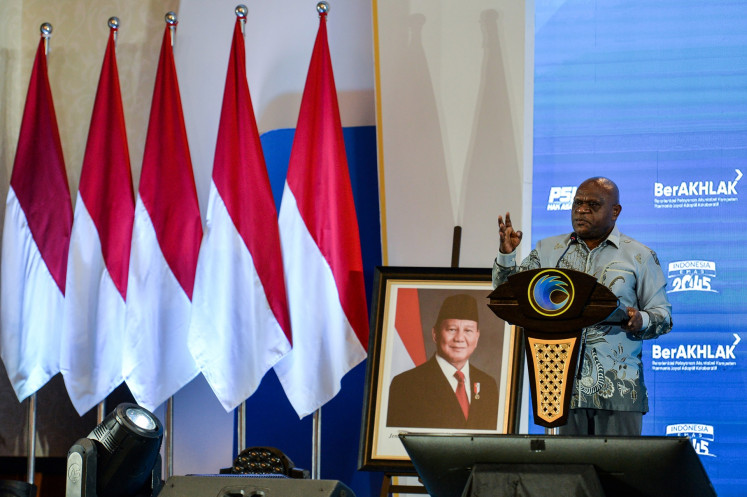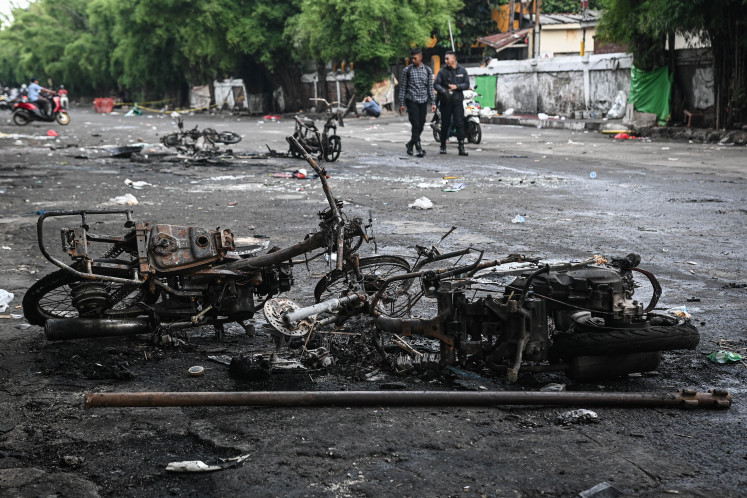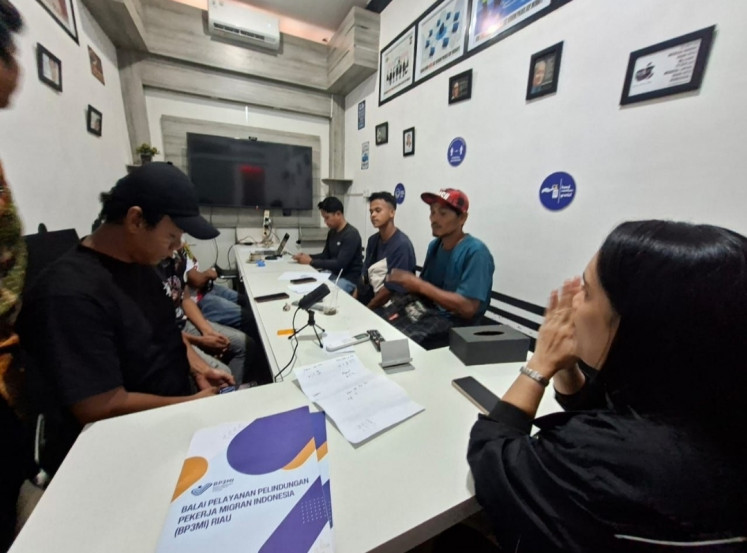Popular Reads
Top Results
Can't find what you're looking for?
View all search resultsPopular Reads
Top Results
Can't find what you're looking for?
View all search resultsBitterness of migrating for school (Part 1)
Forget about dreaming big. For children in Mentawai Islands regency, finishing school is a matter of luck and not the norm.
Change text size
Gift Premium Articles
to Anyone
This is the first of a two-part story, with part 2 to be published on Nov. 4.
The rocky, hilly path didn’t stop teenagers Amus, 19, Gilbert 15, Susan, Theresia, Deni and 17-year-old Hilaris from going to school. Living in Politcoman village in West Siberut district, these teens must head out early, as classes at SMKN 2 South Siberut state vocational senior high school begin at 10:30 a.m.
That day, the students gathered to register for the coming school year, full of hopes and dreams for their future. Amus, Gilbert and Hilaris dreamed of becoming sailors, and chose to major in the maritime studies program. Meanwhile, Susan, Theresia and Deni majored in hospitality.
They decided on their career path for one purpose: to escape poverty. Mentawai is barren of opportunities.
"I want to work soon so I can help my parents, even just a little bit. Especially since I have a younger sibling still in elementary school," said Deni.
The hilltop school is among the limited choices available to the youths. According to data for the 2023-2024 academic year from the Education, Culture, Research and Technology Ministry, Mentawai Islands regency has just three vocational senior high schools (SMKs). This is very different to Jakarta, which has a total of 571 SMKs, including 73 SMKNs.
With only three vocational schools, students in Mentawai must travel great distances from home. This doesn’t come cheap. There are added costs rom transportation to boarding just to attend classes.
Amus said a speedboat to get to school would cost him Rp 108,000. Renting a room measuring 3 meters by 4 meters at a kos (rooming house) between three people meant another Rp 110,000.
That’s not all: "We also need to stock basic cooking supplies like rice, fish, vegetables, eggs and some spices. A sack of rice, which lasts us only two weeks for breakfast and dinner, costs Rp 126,000," he explained.
Empty stomachs
The long journey to school is just the beginning of their day’s struggles. Many arrive at school on empty stomachs.
“The problem is that children here have stomach ulcers because they don't eat properly. I ask them every morning if they've eaten, and they usually say they have. But when I ask about their side dishes, they mention only Royco [seasoning mix] or salt. Sometimes, all they've had is rice,” said Willy Alfanzah, a culinary and student affairs teacher at SMKN 2 Mentawai Islands.
Amus’ experience was no different. Now in his second year of school, he revealed that he had once run out of food and money. He wanted to contact his parents but was unable to, as the internet access in Mentawai was still unreliable. In some villages like Srilanggai, the only available internet access is in the areas around schools. But they are generally located more than 1 kilometer from residential areas and users must compete because of the limited quota.
“There was one day I didn’t eat. I just drank water and sat alone, daydreaming,” Amus recalled.
In such dire situations, the students have only three options: they can borrow money from a friend while they wait for a food parcel from their parents to arrive, wait for a teacher who only has a small salary to take pity on them, or look for a job. Amus chose the third option.
“It’s not much, but I got a job helping [my landlord]. I weave rattan. Around three people can [produce] 1,000 sticks for a wage of Rp 150,000, divided three ways. Not bad for [getting] food," he said.
As a teacher, Willy cannot do much. He and his fellow teachers can only understand their circumstances and make concessions. They allow the students to take side jobs but with one caveat: students must not miss school or be tardy.
Unfortunately, this is no solution. According to Willy, this dependency on their parents’ care packages has led to many students to drop out of school in the middle of a term. Each year, one or two students become victims of their circumstance for this reason, and the numbers increase during the monsoon season (September-April).
“Packages often don’t arrive. Students can’t contact their parents because there’s no network [signal]. And the deliveries can be hampered. There are boats, but no ships. The packages can also rot or get lost [en route] because they are usually entrusted to someone making an island crossing. Maybe they can be trusted, or maybe not. So if there is no package, [the students] end up going home. How can they survive?” said Willy.
---
This article was originally published in Indonesian in Magdalene, an online magazine that educates, empowers and pushes for a more equal society through solution-driven journalism.











